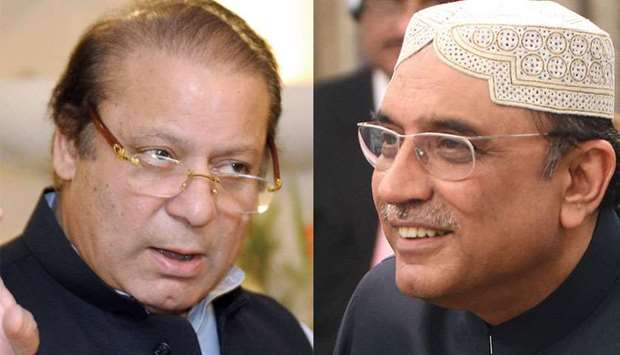As the federal government seeks to carry out the already-delayed legislation for delimitation of electoral constituencies, reports about intense bargaining for an “underhand deal” between Nawaz Sharif’s Pakistan Muslim League-N (PML-N) and Bilawal Bhutto’s Pakistan People’s Party (PPP) are doing the rounds in political circles.
The Senate is expected to take up the constituencies’ delimitation bill tomorrow.
Some political circles believe that the PPP’s reluctance to support the PML-N government in securing the desired two-thirds majority to bring a constitutional amendment in the upper house on constituencies’ delimitation in light of the census 2017 has much to do with its efforts to secure seats in the Senate.
In this context, sources in the ruling camp believe that the PPP wants to pressure the government into striking a deal to secure some seats in the Senate elections scheduled for March next year.
The PML-N is in a comfortable position to secure all the seats from Punjab’s quota in the upper house in the Senate polls, based on the ruling party’s overwhelming strength in the provincial assembly, while the PPP reportedly seeks the co-operation of Sharif’s party to win a few seats from the provincial quota in the upper house.
Other reports suggest that PPP supremo Asif Zardari wants the elevation of his sister Faryal Talpur as the next Senate chairperson, with support of the PML-N.
On the other hand, some quarters in the ruling camp argue that PPP’s opposition to constituencies’ delimitation bill, despite previously agreeing to the proposed legislation, is aimed at securing some seats from southern Punjab in the next general elections.
Zardari’s party has relatively better support base in southern Punjab, as compared to the rest of the province where the PPP is reduced to having a “skeleton” presence.
“Having a solid political footprint in Punjab is not possible without the support of the PML-N. This is the right time for a political bargaining,” a senator said, requesting anonymity.
Rejecting the possibility of a deal between the two parties, a senior PML-N leader said that the ruling party’s chief Sharif was too inflexible to be forced into any such deal.
“Punjab is our political bastion, the hub of our support base. Allowing the PPP to secure some seats in that province would be tantamount to allowing them to make inroads into our political terrain at the cost of denting us,” he pointed out.
“Our leadership is never going to approve it. And, by the way, what’s the guarantee that if any deal takes place, it would be honoured?” he added.
The PML-N source said that the Sindh government believes the reported commitments Prime Minister Shahid Khaqan Abbasi made in the meeting of Council of Common Interests (CCI) last month – regarding payment of outstanding funds to provinces and that of PPP lawmakers in National Assembly from PM’s discretionary quota – were not honoured, which is the reason why PPP has been acting aggressively against the PML-N government.
The Sindh and Khyber Pakhtunkhwa governments opposed the proposed legislation on delimitation of constituencies, taking the apparent stance that a significant number of their populations were ignored in the census and demanding that the prime minister convene the CCI meeting to discuss the issue.
During the said meeting held last month, Abbasi reportedly assured Sindh Chief Minister Murad Ali Shah and KP Chief Minister Pervez Khattak that their reservations would be addressed.
Following consensus, the related bill on constituencies’ delimitation was passed by the National Assembly and is now awaiting Senate nod.
Political analyst and former Election Commission of Pakistan secretary Kanwar Dilshad said that the Senate’s session to take up constituencies’ delimitation bill was originally scheduled for December 18, but has now been rescheduled for December 11 because “something is fishy”.
“I think some sort of agreement must have been reached between the PML-N and the PPP, which is why the Senate session has been summoned earlier. This wouldn’t have been possible in case of a deadlock. Some kind of ‘give and take’ must be taking place,” he said.

Sharif and Zardari
